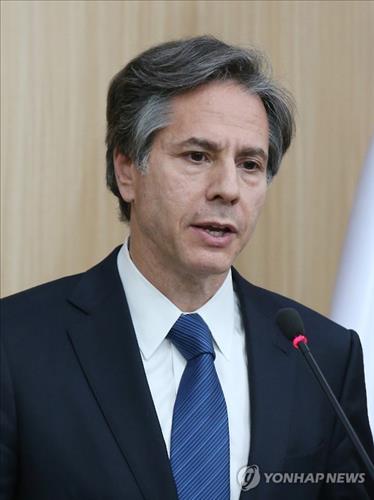- California Assembly OKs highest minimum wage in nation
- S. Korea unveils first graphic cigarette warnings
- US joins with South Korea, Japan in bid to deter North Korea
- LPGA golfer Chun In-gee finally back in action
- S. Korea won’t be top seed in final World Cup qualification round
- US men’s soccer misses 2nd straight Olympics
- US back on track in qualifying with 4-0 win over Guatemala
- High-intensity workout injuries spawn cottage industry
- CDC expands range of Zika mosquitoes into parts of Northeast
- Who knew? ‘The Walking Dead’ is helping families connect
S. Korea, U.S., Japan look to increase military intelligence sharing: top U.S. diplomat

U.S. Deputy Secretary of State Tony Blinken speaks at a news conference at the Foreign Ministry in Seoul on April 19, 2016.
SEOUL, April 20 (Yonhap) — South Korea, the United States and Japan will look to expand their sharing of military intelligence in response to the growing threat posed by North Korea’s nuclear and missile programs, a top U.S. diplomat said Wednesday.
U.S. Deputy Secretary of State Tony Blinken made the remarks in an interview with South Korean reporters, saying the three countries are boosting security cooperation to protect their citizens from any North Korean provocation.
“Information-sharing among us is one important element of being as safe and secure as possible,” he said. “And we will look for ways to deepen that information sharing as we move forward.”
The prospect of sharing military intelligence with Japan has been a sensitive issue in South Korea where there are still deep-seated reservations about the former colonial ruler. In 2012, the two sides tried to sign a General Security of Military Information Agreement (GSOMIA) to share intelligence on North Korea, but the plan was scrapped, as critics accused the government of arranging the deal behind their backs.
The U.S., meanwhile, has sought to strengthen trilateral cooperation with its two East Asian allies and encouraged them to mend ties in part to keep a rising China in check.
Last month, Japanese media said Seoul and Tokyo had agreed to open discussions on signing the GSOMIA, but Seoul denied the report.
Blinken, who arrived in Seoul Tuesday for trilateral talks with his South Korean and Japanese counterparts, stressed that the recent U.N. Security Council sanctions against North Korea are having an effect.
“As the resolution is implemented over the coming weeks and months, the pressure will grow stronger and stronger on North Korea,” he said. “It would be increasingly difficult for it to sell resources in order to get money on its nuclear and missile programs. It would be more and more isolated around the world. And it will have to decide whether it wants to continue on that course or meet its obligations on its denuclearization.”
He also warned that should North Korea conduct another provocation the UNSC will take “additional significant measures.”
North Korea is believed to be preparing to conduct another nuclear test in the coming weeks in clear defiance of the international community’s warnings not to do so.
“I am not going to speculate on what those measures would be. But I can tell you that we are actively discussing additional measures with our partners,” he said.
Even if North Korea decides not to stage another provocation, the international community will keep adding pressure on the North to return to the now-stalled denuclearization talks in a “credible, authentic manner,” he added.
Touching on the controversy over whether South Korea should build its own nuclear weapons to deter North Korean threats, Blinken flatly rejected the idea.
“The defense of South Korea and its people is a solemn obligation for the United States,” he said. “For those reasons, there is no need for South Korea to consider moving in another direction.”
















kelly
November 23, 2017 at 12:09 PM
Very nice and always successful.
This is a very good article.
I’m waiting for you the other article.
togelpelangi